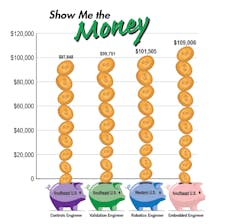It’s probably no surprise that the job outlook for engineers is positive. In a January Bureau of Labor Statistics report, employment in the electrical and electronics space is expected to grow seven percent by the year 2026.
To capitalize on the country’s economic growth, organizations are expanding and looking for more workers to fill traditional roles in addition to new and emerging positions. As such, the engineering market is experiencing a lower unemployment rate compared to the national average, with tens of thousands of jobs expected to be added in the next five years.
At Randstad, we see demand rising for a diversity of engineering skill sets, where competition for candidates is getting fierce:
● Validation Engineers: While the overall job outlook for validation engineers has struggled in past years, demand for them is growing. In fact, the projected total employment for validation engineers is expected to top 194,000 in 2018.
● Controls Engineers: As automation gains traction in manufacturing and beyond, controls engineers are increasingly in demand.
● Robotics Engineers: In a recent poll, 81 percent of senior executives surveyed cited robotics as one of the top five industrial sectors that will hire new workers through the end of this decade.
● Embedded Engineers: Increased demand by consumers and businesses for more connectivity and smarter, more power-efficient electronic technology is driving the demand for embedded systems engineers. Especially sought out are embedded developers with not only the required coding expertise, but also a deep understanding of how software and hardware interact and communicate.
Almost across the board, it is proving extremely difficult for companies to fill open engineering positions today. HR decision makers report the average time to fill a non-executive position is 2.6 months and five months or more to find leadership and executive talent
A key challenge: Many companies are somewhat unrealistic about the importance of offering a competitive salary. Add in the desire for qualified talent with exacting skills and the right cultural fit, and the hiring challenges increase exponentially.
Engineering salaries vary widely, based upon local market conditions and position-specific requirements like experience levels, job title, professional certifications, and knowledge of specific software tools. (Randstad is the source of the salary figures below.)
Nonetheless, many companies seem to put greater value on training opportunities and work-life balance programs than monetary compensation. While these kind of indirect benefits can be attractive, they alone are not going to attract the best talent. The best engineers know what they’re worth and will hold out for a commensurate salary.
Furthermore, factors like an aging workforce and fewer engineering graduates are creating a more competitive talent market. Companies are in particular need of engineers with experience under their belt, but this high demand means candidates have their pick when it comes to the best job offer. In fact, year after year, engineering tops the list of majors with the highest average starting salary.
The market for engineers is only going to get tighter. It will especially be a candidate-driven market, with 65,000 new engineering jobs expected to be created by 2024. Click here to access all of Randstad's 2018 salary guides.

